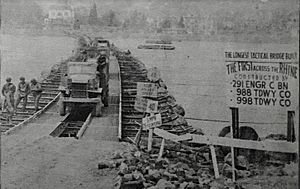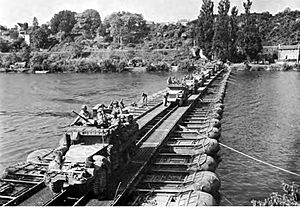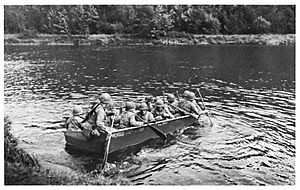291st Engineer Combat Battalion (United States) facts for kids
Quick facts for kids 291st Engineer Combat Battalion |
|
|---|---|

This 1032 foot long treadway bridge was the first tactical bridge built across the Rhine River completed on 10 March 1945. It was constructed under heavy enemy fire in 32 hours about 400 meters downstream from the Ludendorff Bridge during the Battle of Remagen.
|
|
| Country | |
| Branch | |
| Type | Combat engineer |
| Size | Battalion |
| Nickname(s) | Damned Engineers |
| Engagements | World War II |
| Decorations | Presidential Unit Citation |
| Commanders | |
| Notable commanders |
Colonel David E. Pergrin |
The 291st Engineer Combat Battalion was a very important group of engineers in the United States Army during World War II. They played key roles in two major events: the Battle of the Bulge and crossing the River Rhine at Remagen.
This battalion was led by Colonel David E. Pergrin. They earned a special award called the Presidential Citation. This was for their brave actions in the Ardennes region. They blew up bridges and even fought as regular soldiers. This helped stop the German army from moving forward towards Antwerp.
On December 17, 1944, scouts from the 291st found 17 people who had survived a terrible event called the Malmedy massacre. After nearly a month of tough fights against German tanks, Company C of the battalion returned to Malmedy. On January 14, 1945, they found the bodies of 86 US soldiers who had been killed there.
The battalion also helped build the first pontoon bridge across the Rhine River at Remagen. This bridge was very important. It helped US Army vehicles and soldiers cross the river. This made it easier for the army to move into central Germany. The bridge helped a lot because the nearby Ludendorff Bridge was badly damaged.
The 291st started with about 600 men. By the end of the war, 93 were wounded and 8 were killed. During their time in Europe, they built many things. They constructed 23 timber bridges and 44 Bailey bridges. They also built 7 treadway bridges. Eleven of these bridges were built while under enemy fire. They also destroyed 6 bridges and helped with 7 river crossings. The engineers even disarmed 15 bombs and cleared 7,000 mines. They also took 8,500 German prisoners.
What Engineers Do

As a combat engineer battalion, the 291st helped the army in many ways. They provided support that was key to fighting the war. This included building things and taking things apart. They also helped with sanitation and making maps. Clearing minefields was another important job. They even gathered information for the army.
Combat engineer battalions also had their own weapons. They used .30 cal. and .50 cal. machine guns. They also had anti-tank rockets and grenade launchers. When needed, they were ready to fight like regular infantry soldiers.
Here are some of the things the 291st engineers did:
- Building and fixing bridges (mobile, floating, and fixed).
- Building and fixing roads and railways.
- Helping soldiers cross rivers using boats or rafts.
- Demolition, which means blowing things up safely.
- Placing or disarming bombs and mines.
- Keeping ports and harbors working, including beachheads.
- This included building roads and moving supplies, vehicles, and people from ships.
- Using Camouflage to hide things.
- Providing clean water and sanitation.
- Making maps for the army.
- Fixing vehicles.
- Setting up and maintaining supply areas.
- Building barracks and other army structures.
- Helping with rescue missions and road patrols.
- Checking bridges and roads for safety.
- Clearing away debris and wreckage.
- Fighting as infantry soldiers when needed.
They used special equipment for these jobs. This included assault boats for river crossings. They also built different types of pontoon bridges. These included M1 treadways and strong steel Bailey bridges.
Images for kids
- The 291st in Action
-
291st engineers disarm a booby-trapped Sturmgeschütz III during the Battle of the Bulge
 | Audre Lorde |
 | John Berry Meachum |
 | Ferdinand Lee Barnett |






